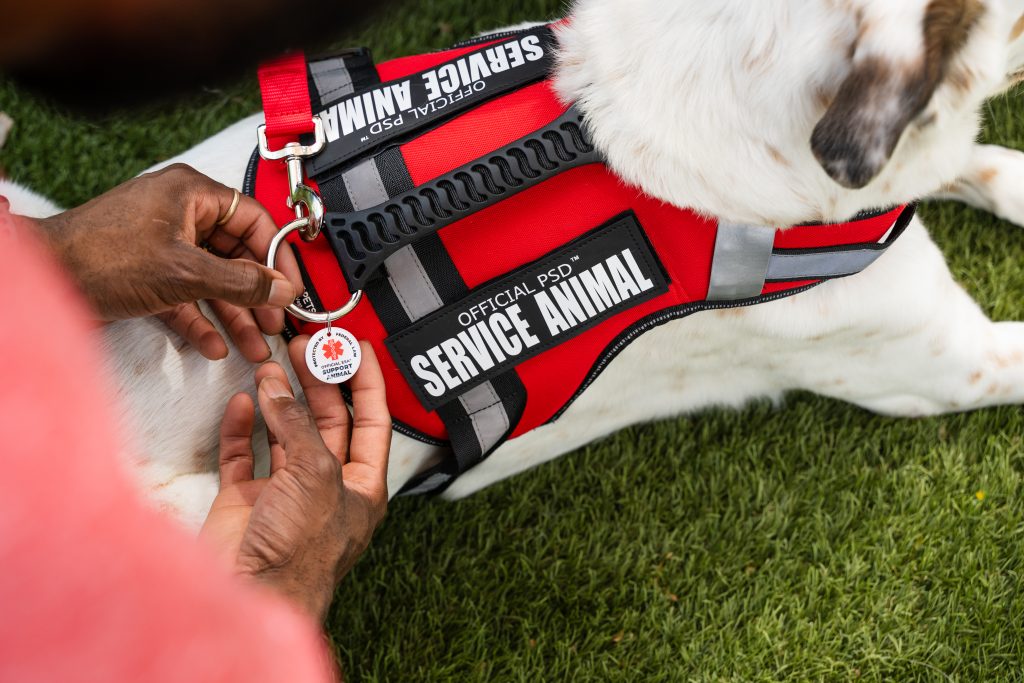Order includes Free:
ESA Fastpass® ID & Televet Services

If you’ve been searching how to register an emotional support animal, you’re not alone. The internet is full of sites promising quick ESA registration, ID cards, and certificates. It’s easy to assume that’s the right path.
But here’s the truth: no federal or government registry for emotional support animals—and no law that requires one.
What matters most is having a valid ESA letter from a licensed professional. That letter confirms your emotional need and is the only document that gives you legal protections under the Fair Housing Act.
At Support Pets, we skip the gimmicks. We offer a simple, compassionate process to help you and your emotional support cat or dog stay connected, supported, and protected.
*Support Pets provides ESA documentation through licensed practitioners. Cats and dogs only. Substantial limitations apply. Not available in California, Colorado, Louisiana, or Arkansas.
Let’s clear this up: ESA registration isn’t legally required—because no federal or state agency runs an official registry for emotional support animals.
Sites that claim to offer official ESA registration usually sell documents that don’t offer legal protection. Landlords don’t have to accept those papers—and often don’t.
To gain housing rights, you need one thing: a valid ESA letter from a licensed medical professional.
Support Pets makes that process fast, secure, and judgment-free—no fake registries, just real support.

If you’ve been told to register your emotional support cat or dog, you’re not alone—and you’re not wrong to feel confused. Many sites make ESA registration sound official, but it’s not.
You don’t need a certificate, an ID badge, or a registry listing. You need something more powerful: an ESA letter from a licensed professional.
That’s the document that:
At Support Pets, we believe clarity and compassion matter. We’re here to provide real answers and real solutions—so you can move forward with confidence.
*Support Pets provides ESA documentation through licensed practitioners. Cats and dogs only. Substantial limitations apply. Not available in California, Colorado, Louisiana, or Arkansas.
Forget the flashy ID cards or registration sites. If you want to legally live with your emotional support cat or dog—even in no-pet housing—an ESA letter is what you need.
It’s a legally recognized document, written by a licensed medical professional, that confirms your emotional need for support.
Support Pets makes the process easy: no appointments, no paperwork, no stress.
With a valid ESA letter, you may:

A real ESA letter is more than a feel-good note. It’s a legal document with specific requirements.
Here’s what a valid ESA letter must contain:
At Support Pets, every letter is reviewed by a licensed practitioner and built to meet legal standards—so you’re protected from the start.
*Support Pets provides ESA documentation through licensed practitioners. Cats and dogs only. Substantial limitations apply. Not available in California, Colorado, Louisiana, or Arkansas.
If your housing situation feels uncertain, you might be tempted by sites offering ESA registration to “make it official.” But here’s the truth: you don’t need to register your emotional support animal.
Under the Fair Housing Act, all you need is a valid ESA letter. That’s what gives you the right to request housing accommodations, even in buildings with no-pet policies.
ESA registration websites offer no legal standing—and many landlords ignore them.
Support Pets provides the only documentation that matters, with none of the unnecessary extras.
*Support Pets provides ESA documentation through licensed practitioners. Cats and dogs only. Substantial limitations apply. Not available in California, Colorado, Louisiana, or Arkansas.

If your cat or dog helps you feel calm, grounded, or emotionally supported, you may qualify for ESA approval. And with Support Pets, you can complete the process 100% online.
Here’s How It Works:
No confusing forms. No registry sign-ups. Just emotional support animal registration online done right—without the registry. Wondering if an ESA is right for you? Learn more about who qualifies and how emotional support animals can help.
No, ESA registration is not recognized by the U.S. government. Only a valid ESA letter provides legal housing protection.
ESA registration refers to unofficial certificates or ID cards. A real ESA letter is written by a licensed professional and backed by law.
You can apply for ESA approval online—but remember, registration isn’t required. What matters is getting a valid ESA letter.
They’re selling services that sound official but offer no real protection. A valid ESA letter is what matters for legal rights.
Check for a licensed practitioner’s name, license number, and confirmation of your need. Still unsure? Support Pets is here to help.

Your emotional support dog or cat means everything. Let’s protect that bond with the documentation that truly matters.
At Support Pets, we’re here to help you feel confident and secure—with a valid ESA letter backed by licensed professionals, not paperwork from a registry.
*Support Pets provides ESA documentation through licensed practitioners. Cats and dogs only. Substantial limitations apply. Not available in California, Colorado, Louisiana, or Arkansas.